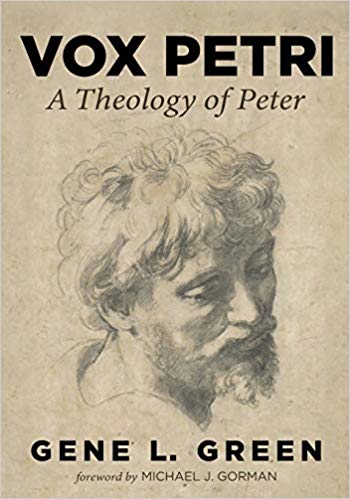In most ways, the most helpful portion of Gene Green’s detailed study is the long chapter on 1 Peter.Lot’s of good exegesis and theological reflection can be found on pp. 301-400. In this chapter Green rightly demonstrates that 1 Pet. 5. 12 refers to writing briefly with the help of Silas about the various topics included in the letter. Peter is the author of this letter, and Silas is the facilitator, turning Peter’s ideas into some of the best Greek in the NT. Unlike say 1 Thessalonians, Silas is not indicated to be a co-author with Peter in this document. It would be helpful at some juncture if someone would try and put the pieces together about Silas/Silvanus’ role in early Christianity, considering he is one of the emissaries who circulates James’ letter after the Acts 15 council, he is a sometime co-worker with Paul, and a sometime co-worker with Peter as well as 1 Pet. 5.12 suggests. And unlike Titus, who is nowhere mentioned in Acts, we find Silas in all three sources. I am not convinced by Green’s argument that despite Eusebius (H.E. 3.1.2); Jerome (de vir il.1), and Epiphanius (27.6.6.) all telling us Peter went to Anatolia, and Eusebius is also clear he wrote 1 Peter to Jews, we should ignore this evidence, as if it was just a made up tradition these early Christian writers followed.
One of the things that needs to be reflected on is how very difficult it would be in a small religious movement to pull off a pseudepigrapha. The more particulars added to such a document, the less convincing it becomes because it could be cross-checked by near contemporaries. Green earlier in his study rightly notes that for the most part, 2nd-4th century forgers didn’t attempt phony letters from apostles, they tried other things like Gospels or Apocalypses of Peter, and by the way, even then they were often detected as phony. Elliot, whose commentary on 1 Peter is excellent in various ways, wants to maintain the letter was written by a Petrine community after the death of Peter, someones who knew Peter and his traditions and ideas. But surely the references to Mark and Silas in the letter closing itself, means they worked with Peter, and even if the letter was assembled immediately after Peter’s death on the basis of his teaching, it would still be his teaching. But what 1 Pet. 5.12 strongly suggests is that it was composed while Peter was alive, since it says he is writing briefly through Silas, not that Silas is writing for him ex post facto. There is a difference.
Green’s argument is that Peter is referring to the audience as resident aliens in a spiritual way, a status that happened to them after their conversion, which led to their marginalization. But nothing in the beginning of this document (cf. 1 Pet. 1.1,17; 2,11) suggests this. To the contrary, these social designations are simply mentioned up front without qualification, in the same way the list of provinces are mentioned. The person hearing 1 Pet.1 for the first time would simply assume the terms were meant literally (see Elliot on this). And in any case there is no need to talk about a Diaspora, that is a dispersion of persons if they are all, or almost all Gentiles. Gentiles had not been scattered into Gentile lands. The term is a Jewish one referring to actions taken on or by Jews, just as in James 1. And consider the exhortation in 1 Pet. 4.2–‘you’ve spent enough time already doing what Gentiles like to do’. This is a very odd remark if Peter is addressing those who were always Gentiles– rather he is distinguishing them from Gentiles in that verse and telling them to stop acting like Gentiles, something they are not!
For my money it is Chapter 8, which begins on p. 315ff. which is the very best chapter in the whole book, which helpfully walks us through the theology in 1 Peter, and shows what an important contribution Peter makes to early Christian theologizing. This should be required reading for Protestants who practice benign neglect of this letter. Green is right that there is a strong emphasis and theology of grace in this document. Green takes a more Calvinistic approach to the language about ‘foreknowledge’ in 1 Peter which he takes to mean pre-ordaining, but as Origen and Chrysostom made clear long ago, the term in question doesn’t mean pre-destine, it means knowing in advance, as I point out at length in my 1 Peter commentary. Not everything God knows, in advance, has he willed in advance, and in particular he has not willed sin or evil and yet he knows it.
There is a strong and helpful discussion of vicarious atonement through Christ’s death on pp. 354ff. and here Green is spot on, as the Brits would say, as Peter draws on a profound reflection on Isaiah 53 to craft his thoughts on this subject. I will leave the readers of this blog to soak up much more of this good book on their but would remind them of Sir Francis Bacon’s advice: “Some books are to be tasted, others to be swallowed, and some few to be chewed and digested; that is, some books are to be read only in parts; others to be read, but not curiously; and some few are to be read wholly, and with diligence and attention.” Gene Green’s book is of the latter sort, and kudos to him for writing it.













